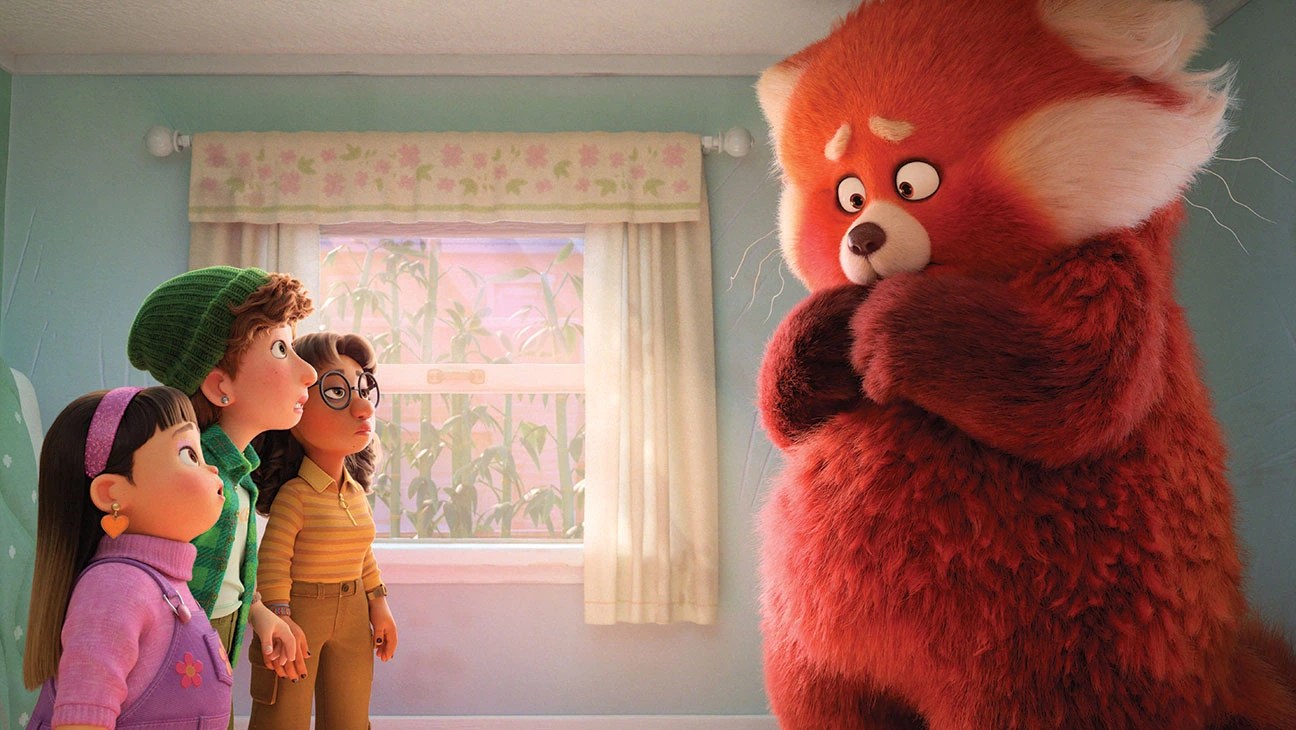Cast and Crew of ‘Turning Red’ Talk Growing Up and the Early 2000s

Turning Red brings the early 2000s to life in a way that should have all of us ’90s kids crying over being a teenager again. But what’s fascinating is that the cast is, for the most part, too young to even remember 2002. In fact, the star of the film, Rosalie Chiang (voice of Meilin Lee), wasn’t even born yet. But still, the movie works and is a perfect little capsule of growing up in the boy band craze.
Talking with the cast at the press conference for the film, I asked them about the time period and what it was like learning about 2002 and how these teenagers (who would have been born in the late ’80s and early ’90s) dealt with growing up.
Maitreyi Ramakrishnan (the voice of Meilin’s friend Priya), who is from the Toronto area, said it was fun to see a place she knew in a different time period. “For me, it’s really cool to just see. You know, when we watch the movie, we get to see the set,” she said and went on to later talk with costar Sandra Oh (Ming Lee, Meilin’s mother), who is also from Canada, about seeing the Sky Dome instead of the current Rogers Centre.
“The good-ol’ Sky Dome instead of the Rogers Centre,” Ramakrishnan said. “It was like, oh, oh God. Like, that’s a throwback. I mean, I’m 2001, so not a ’90s kid at all. But it was still really cool to see how it’s like, okay, this is where I grew up still.”
That ushered Oh into talking about how the opening montage of the film showed her exactly where the movie was taking place. “I knew exactly the corner. I saw her opening montage, and I was like … that is the corner of Spadina and Dundas.”
Stars Rosalie Chiang and Ava Morse didn’t relate to the Canadian reference points, but the two did love learning about the time period and seeing how everyone dressed back in 2002—especially for Morse, who talked about the fashion of the ’90s and early 2000s and how it is back in style now. “Kinda seeing that, like, when it was in its prime is kinda fun, ’cause I’m wearing that now. [LAUGH] That was weird.”
For Chiang, though, it was about not having these girls on their phones. “They’re not on their phones the entire time,” Chiang said. “I think if nowadays, if you were to create that story but in 2022, it’d be completely different,” to which Morse responded that it would take place on “Snapchat.”
The importance of Turning Red
Talking with director Domee Shi, producer Lindsay Collins, and co-screenwriter Julia Cho, I asked about how it feels making a movie like this for younger audiences to always have to look to. Growing up, many of us (especially teenage girls) didn’t have movies that we could relate to, but now, with things like Inside Out and now Turning Red, that’s changing for the next generation.
Domee Shi said that she hopes that’s what Turning Red is for young girls. “Yeah, I hope so. That was the goal for making the movie,” Shi said. “To make it for the 13-year-old me, who was like, ‘What’s happening to me? No one’s telling me anything.’ So I think that’s so cool that it really-that it can do that, but also make you laugh, as well.”
Collins talked a bit about how lonely it can feel when your life starts to change growing up and how no one seems to want to talk with you about it. “I think one of the worst things about going through some of this is how alone it makes you feel. Like, ’cause it feels so foreign, and so sudden, and so personal and a little out of control,” she said. “Like, you feel like you don’t quite understand your own behavior. You know, you’re supposed to be the expert on yourself, and it feels very off put-weird and you feel off kilter.”
She went on to talk more about what she hopes happens with this movie in the future:
And so, hopefully that this movie will kind of dispel that, and be like, no, no, no, everybody’s feeling this way when they’re going through it. Either they felt it before, they’re about to feel it, or they’re actively feeling it right now. And it’s actually super normal. Like, it’s part of growing up, and it’s part of you becoming an adult. All of these weird feelings is actually good-it’s a huge evolutionary growth moment in your life, and it’s really okay. I think it’s so important. And hopefully, they look to it for comfort.
The script was co-written by Shi and Julia Cho, and it seems as if Cho was thinking about how this film will touch other generations as the Pixar films she loved it. “I think that stepping into a Pixar project, I did have this sense of like, “This is someone’s collective generational memory,” right? That is going-like, the way I’ve been touched by Pixar movies, and the way my kids are touched by them. And I think that the thing that I’m proudest of, is that we created, we hope, I think a film that makes anyone watching it, you know, girl or not girl, kid or parent feel seen and understood. And for me, that was always the goal. And fingers crossed, we landed it.”
Turning Red is heading to Disney+ this week and is well worth the watch. Just maybe bring tissues because it IS a Pixar movie about growing up—so, as adults, we’ll all cry.
(image: Pixar)
Have a tip we should know? [email protected]
